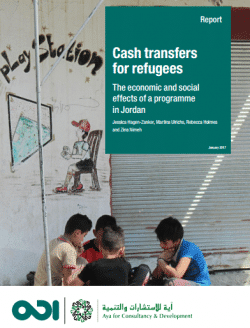
Policy highlights:
- UNHCR is providing long-term cash transfers (of at least one year) in Jordan, in contrast to the usual short-term interventions offered in a humanitarian context. This long-term intervention has both economic and social effects.
- The economic effect is that beneficiaries are able to overcome financial barriers to accessing goods and services, enabling them to meet basic needs like rent and utilities. However, the impact of long-term cash transfers on employment and the prevention of negative coping mechanisms, like child labour, is limited.
- In terms of social effects, access to a regular income has reduced stress and anxiety for a third of the participants. This is enabled by the long-term nature of the programme, which provides regularity and predictability.
- Cash transfer programmes exist in parallel to national services, which can pose challenges. To achieve long-term social and economic integration, programmes should address segregation and feelings of resentment among the general population.




